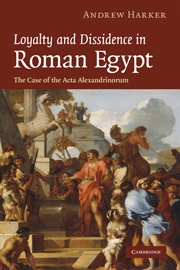Book contents
- Frontmatter
- Contents
- Note on abbreviations
- Chapter 1 Introduction
- Chapter 2 The embassies to Gaius and Claudius
- Chapter 3 The Acta Alexandrinorum: Augustus to the Severans
- Chapter 4 The Acta Alexandrinorum: The historical background
- Chapter 5 Between loyalty and dissent: The Acta Alexandrinorum and contemporary literature
- Chapter 6 Conclusion
- Appendix I Editions of the Acta Alexandrinorum and related texts
- Appendix II The status of the Alexandrian Jews
- Appendix III The ‘dubious or unidentified’ fragments
- Bibliography
- Index
Appendix III - The ‘dubious or unidentified’ fragments
Published online by Cambridge University Press: 22 September 2009
- Frontmatter
- Contents
- Note on abbreviations
- Chapter 1 Introduction
- Chapter 2 The embassies to Gaius and Claudius
- Chapter 3 The Acta Alexandrinorum: Augustus to the Severans
- Chapter 4 The Acta Alexandrinorum: The historical background
- Chapter 5 Between loyalty and dissent: The Acta Alexandrinorum and contemporary literature
- Chapter 6 Conclusion
- Appendix I Editions of the Acta Alexandrinorum and related texts
- Appendix II The status of the Alexandrian Jews
- Appendix III The ‘dubious or unidentified’ fragments
- Bibliography
- Index
Summary
For the sake of completeness, I append the following survey of the dubia vel incerta, fragmentary texts which either may belong to the Acta Alexandrinorum literature because they use the same ideas, terminology and format found in other examples of the literature, or do belong but provide no dramatic context. The dubia vel incerta add little to our knowledge of the literature, but are further evidence for how widespread and popular this literature was in Roman Egypt.
1. P.Aberd. 117 is a small scrap (2 × 2.8, 6.7 × 2.9 cm) from the Fayum and is written in a hand of the early first century ad. It mentions a ‘war’, using the term polemos, which is used elsewhere in the literature to describe the violence between Greeks and Jews in Alexandria. The accusative plural ‘you’ suggests direct speech, and that the text may have taken the form of a dialogue.
2. Acta xx, a small fragment (4.8 × 4.5 cm) from the late second–early third century ad, uses terminology found in examples of the Acta Alexandrinorum literature. It mentions the ‘emperor and lord’ (l. 3) and ‘the emperors’ (sebastoi), perhaps a reference to a policy followed by previous emperors or an indication that this text reports events from a joint reign. The characters Hime[rus(?)] (l. 2) and Archias (l. 5) are not known elsewhere in the literature but may be Jewish and Greek ambassadors.
- Type
- Chapter
- Information
- Loyalty and Dissidence in Roman EgyptThe Case of the Acta Alexandrinorum, pp. 221 - 224Publisher: Cambridge University PressPrint publication year: 2008

